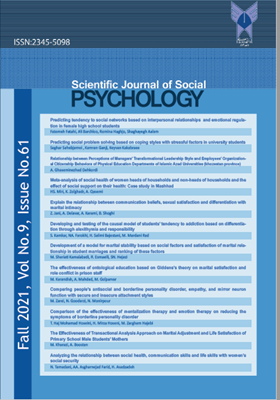Predicting social problem solving based on coping styles with stressful factors in university students
Subject Areas : social psychology
Saghar Sahebjamei
1
,
Kamran Ganji
2
*
![]() ,
Keyvan Kakabraee
3
,
Keyvan Kakabraee
3
1 - PhD Student of Educational Psychology, Department of Psychology, Saveh Branch, Islamic Azad University, Saveh, Iran
2 - Associate Professor, Department of Psychology, Malayer Branch, Islamic Azad University, Malayer, Iran
3 - Associate Professor, Department of Psychology, Kermanshah Branch, Islamic Azad University, Kermanshah, Iran
Keywords: social problem solving# coping styles with stressful factors# university students,
Abstract :
Everyone including university students faces many interpersonal problems and challenges in life, and the important thing is how to solve them, which seems coping styles with stressful factor to be related to it. As a result, the aim of this research was predicting social problem solving based on coping styles with stressful factors in university students. The present study was cross-sectional from type of correlation. The research population was all undergraduate students of Islamic Azad University of Saveh branch in 2019-2020 academic years. The sample size was calculated according to Cochran's formula 220 people who were selected by multi-stage cluster sampling method. The research tools were the social problem solving revised inventory (D’Zurilla & et al, 2002) and coping styles with stressful factors questionnaire (Endler & Parker, 1990). Data were analyzed by Pearson correlation coefficient and multiple regression with enter model methods in SPSS version 22 software in the significan level of 0.05. The results of Pearson correlation coefficients showed that problem-oriented style had a positive and significant relationship with adaptive problem solving and emotion-oriented and avoidance-oriented styles had a negative and significant relationship with adaptive problem solving and problem-oriented style had a negative and significant relationship with non-adaptive problem solving and emotion-oriented and avoidance-oriented styles had a positive and significant relationship with non-adaptive problem solving (P<0.05). Also, the results of multiple regression with enter model showed that coping styles with stressful factor could explain 68% of the changes in adaptive problem solving and 22% of the changes in non-adaptive problem solving (P<0.05). According to the results of the present study, university psychologists and counselors to increase adaptive problem solving and decrease non-adaptive problem solving in students can provide the background for improving coping styles with stressful factor.
جمالی قراخانلو، یاور؛ ستارپور ایرانقی، فریبا و نجفی، سکینه. (1395). بررسی رابطه سیستم مغزی- رفتاری با شیوههای مقابله با استرس و نقش آن در سلامت روان دانشآموزان. نشریه پرستاری کودکان، 3(2)، 40-34.
حقشناس، زینب؛ نوری قاسمآباد، ربابه؛ مرادی، علیرضا و صرامی، غلامرضا. (1392). ارزیابی سبکهای مقابله و باورهای فراشناختی در دانشجویان با اضطراب امتحان: بررسی نقش واسطهای سبکهای مقابله. فصلنامه روانشناسی شناختی، 1(2)، 40-30.
طهماسبیپور، نجف و شهریاری، نسیبه. (1398). اثربخشی آموزش مفاهیم یادگیری خودتنظیمی بر پرخاشگری و حل مساله اجتماعی دانشآموزان بیشفعال. مجله روانشناسی اجتماعی، 13(50)، 33-23.
فطین، شهاب؛ حسینیان، سیمین؛ اصغرنژادفرید، علیاصغر و ابوالمعالی، خدیجه. (1396). ارزیابی مدل نقش مهارت حل مسئله اجتماعی و سرمایه روانشناختی بر فرسودگی تحصیلی با میانجیگری کمکطلبی از همسالان و وجدان تحصیلی. پژوهشنامه روانشناسی مثبت، 3(4)، 90-75.
کاکابرایی، کیوان و عزتی، نسیم. (1397). الگوی روابط ساختاری حل مساله اجتماعی، ادراک کیفیت روابط اجتماعی و بهزیستی هیجانی. فصلنامه اندیشه و رفتار در روانشناسی بالینی، 12(43)، 16-7.
Abdolmanafi, A., Nezamipour, E., Besharat, M. A., & Etemadi, M. (2015). The mediating role of coping styles and problem-solving methods in rumination and depression of students. International Journal of Behavioral Sciences, 9(1), 61-69.
Boulton, K., Coute, E., Grimmer, A. J., Earley, R. L., Canario, A.V. M., Wilson, A. J., & Walling, C. A. (2015). How integrated are behavioral and endocrine stress response traits? A repeated measures approach to testing the stress coping style model. Ecology and Evolution, 5(3), 618-633.
Bozkurt, G., Uysal, G., & Duzkaya, D, S. (2019). Examination of care burden and stress coping styles of parents of children with autism spectrum disorder. Journal of Pediatric Nursing, 47, 142-147.
Burkholder, E., Hwang, L., & Wieman, C. (2021). Evaluating the problem-solving skills of graduating chemical engineering students. Education for Chemical Engineers, 34, 68-77.
Cooney, R., Stewart, N., Ivanka, T., & Haslem, N. (2018). Representational artefacts in social problem solving: A study from occupational rehabilitation. Design Studies, 56, 149-168.
D’Zurilla, T. J., Nezu, A. M., & Maydeu-Olivares, A. (2002). Manual for the social problem solving inventory-revised. Nourth Tonawanda, TY: Multi-Health Systems.
D’Zurilla, T. J., & Chang, E. C. (1995). The relations between social problem solving and coping. Cognitive Therapy and Research, 19, 547-562.
Endler, N. S., & Parker, J. D. (1990). Multidimensional assessment of coping: A critical evaluation. Journal of Personality and Social Psychology, 58(5), 844-854.
Fteiha, M., & Awwad, N. (2020). Emotional intelligence and its relationship with stress coping style. Health Psychology Open, 7(2), 1-9.
Fuente, A. D., Chang, E, C., Cardenoso, O., & Chang, O. D. (2019). The psychological impact of social problem solving under stress in adults: Debased life satisfaction, heightened depressed mood, or both? Personality and Individual Differences, 146, 46-52.
Jackson, S. L. J., & Dritschel, B. (2016). Modeling the impact of social problem-solving deficits on depressive vulnerability in the broader autism phenotype. Research in Autism Spectrum Disorders, 21, 128-138.
Grubman-Nowak, M., Jezewska, M., Szafran-Dobrowolska, J., Slizien, A, D., & Renke, M. (2020). Occupational activity after renal transplantation vs quality of life, personality profile, and stress coping styles. Transplantation Proceedings, 52(8), 2423-2429.
Keng, Sh., & Tan, J. X. (2017). Effects of brief mindful breathing and loving-kindness meditation on shame and social problem solving abilities among individuals with high borderline personality traits. Behaviour Research and Therapy, 97, 43-51.
McCormick, S. P., Nezu, C. M., Nezu, A. M., Sherman, M., Davey, A., & Collins, B. N. (2014). Coping and social problem-solving correlates of asthma control and quality of life. Chronic Respiratory Disease, 11(1), 15-21.
Sharaf, A. Y., Lachine, O. A., & Thompson, E. A. (2018). Rumination, social problem solving and suicide intent among Egyptians with a recent suicide attempt. Archives of Psychiatric Nursing, 32(1), 86-92.
_||_

